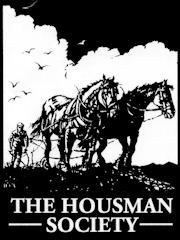A Shropshire Lad
|
Key: V: Textual Variation. C: Commentary. Q: Question. Glossary
ASL XXXI “On Wenlock Edge the wood’s in trouble”
Top ▲ Glossary
| Line | Word | Glossary |
| 3 | saplings | Small trees |
| 5 | holt | 1. A wood or copse (archaic) |
| 5 | hanger | 1. A small area of woodland, clinging to the side of a hill. 2. A short sword worn on a belt |
| 5 | yeoman | 1. A loyal, reliable, or diligent worker
2. A member of a former class of English commoners who owned and cultivated their own land |
Top ▲ Commentary
| Line | Commentary |
| Date: Oct – Dec 1895 | |
| 1 | Wenlock Edge: a wooded escarpment in Shropshire, running SW from Much Wenlock to Craven Arms |
| 2 | Wrekin: a prominent hill, just over 300m, which dominates the countryside to the north of Much Wenlock and SE of Shrewsbury |
| 6 | Uricon: Viriconium (now Wroxeter); in the First Century AD, this was the fourth largest town in Roman Britain, with a legionary fortress and civilian settlement. |
| meter | Four line stanzas of alternately nine and eight syllables, rhymed alternately; the additional syllable in the odd-numbered lines produces a feminine ending to those lines |
Top ▲ Variations
| Line | Text | Textual variation |
| 3 | D | The gale] <It blows> \ The wind / |
| 5 | D | through holt] <on hill> |
| 7 | D | <’Twas> \ ’Tis / the <same> \ old / wind \ <gale> / in the <same> \ old / anger |
| 8 | D | threshed] <wrecked> |
| 9 | D | Then] <Once> |
| 17 | D | The gale] <It blows> \ The wind / |
Top ▲ Questions
| Line | Question |
| 1 | Explore the effect of the additional syllable in the odd-numbered lines; how does it change the mood of those lines? |
| 2 | Why do you think the poet uses personification to describe the woods and hills? |
| 3 | What effect does substituting “gale” for “wind” have in this line? |
| 7 | What effect does substituting “old” for “same” have in this line? |
| 20 | The poem deals with the passage of time; do you find its final message more positive or negative? |
